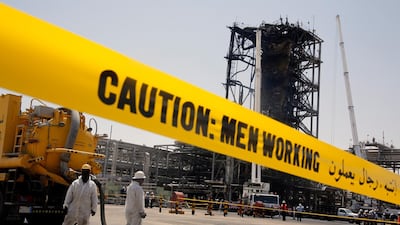Saudi Aramco restored production to pre-attack levels following the strikes last month on its facilities, which cut off half of its supply and caused oil prices to spike, according to the chief executive of the company's trading unit.
"On production, we’re keeping at 9.7 million bpd. We’ve reached the same level we were pre-attacks," Ibrahim Al Buainain said on the sidelines of a conference in Fujairah.
"We produce more to rebuild inventories. We’re not putting more volume in the market; we’re putting excess to replenish stocks." he said.
Saudi Arabia reported 9.789 million bpd of output in August, according to Opec.
The attacks last month hit at the heart of the Saudi energy landscape, targeting an oil processing facility – the world's largest – as well as an oilfield in the Eastern Province, taking out 5.7 million bpd or 5 per cent of global supply.
The world's largest oil exporter tapped its inventories to meet customer obligations following the incidents.
"Not one single shipment to any Saudi Aramco customer was missed or cancelled as a result of that," said Mr Al Buainain.
The kingdom's energy ministry said two days after the attack that nearly 50 per cent of output had been restored. Meanwhile, Saudi Arabia's production capacity – which was at 12 million bpd before the attacks – would be restored in phases, the kingdom's Energy Minister Prince Abdulaziz bin Salman said. Full capacity is expected to come back online by November.
_____________
Aftermath of Saudi Aramco attacks - in pictures
_____________
Mr Al Buainain said the company is "well prepared" and has the ability to "restore things".
"That’s actually a demonstration of how can we – if we’re attacked – how we can restore the business," he added.
He dismissed speculative reports that Aramco made large purchases of crude from outside to meet supply shortages, saying it was only a normal trade pattern.
The trading unit buys crude from third-party sources as well in order to swap it for products. Aramco Trading buys 800,000 bpd to 1 million bpd of crude from non-Saudi sources, Mr Al Buainain said.
"Now we have not changed our trade pattern as a result of this imbalance, so when people saw we’re buying diesel from Adnoc, it doesn’t mean we’re short in the kingdom. Our trade is normal; we have not changed anything as a result of the impact of the attacks from a trading perspective," he said.





















